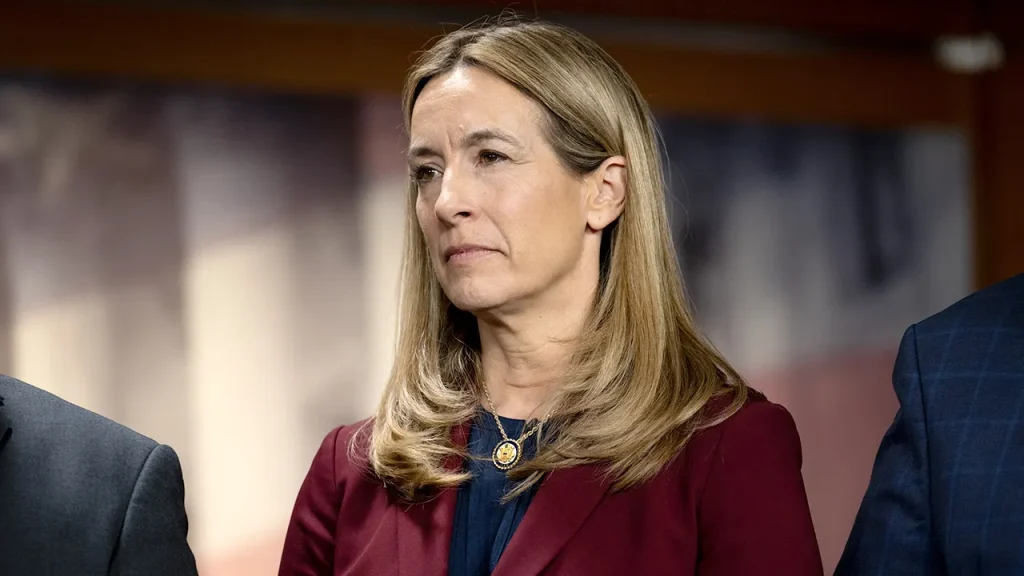The Silence of Mikie Sherrill: New Jersey Reacts to the Death of Joanne Chesimard
As news of Joanne Chesimard’s death spreads throughout New Jersey, a notable political silence has emerged from Democratic gubernatorial candidate Mikie Sherrill. The absence of her voice stands in stark contrast to the chorus of responses from both sides of the political aisle, including her Republican opponent Jack Ciattarelli. Chesimard, who later adopted the name Assata Shakur, has remained a deeply divisive figure in New Jersey since her 1973 conviction for killing State Trooper Werner Foerster during a traffic stop on the New Jersey Turnpike. After escaping prison in 1979 and finding refuge in Cuba by 1984, she became a symbol of both revolutionary resistance to some and unconscionable violence to others. Her recent death in Cuba has reopened old wounds and sparked renewed conversations about justice, accountability, and the lasting impact of political violence.
The Republican response to Chesimard’s death has been swift and unequivocal. Jack Ciattarelli’s campaign released a statement emphasizing that her death “is a reminder of the lasting tragedy that justice was never served for the murder of Trooper Werner Foerster.” He added, “Though she will never be held accountable, we honor Trooper Foerster’s sacrifice and stand with all who carry his memory forward.” This sentiment echoes across Republican responses, with Assemblyman Mike Inganamort condemning those who would celebrate “a cop killer” and Representative Tom Kean focusing on honoring Foerster, saying he “will forever be remembered for his honorable service and ultimate sacrifice.” The unified message from Republicans centers on the lost opportunity for justice and the importance of remembering the victim rather than the perpetrator.
Democratic leaders, with the notable exception of Sherrill, have also spoken out following Chesimard’s death. Governor Phil Murphy confirmed speaking with Secretary of State Marco Rubio about the Cuban government’s confirmation of her death, lamenting that “she has passed without being held fully accountable for her heinous crimes.” Murphy took a strong stance against repatriating Chesimard’s remains to the United States and publicly condemned the Chicago Teachers Union for a post honoring her as a “revolutionary fighter,” calling their statement “shameful and depraved.” Similarly, Democratic Representative Josh Gottheimer emphasized his long-standing support for New Jersey State Troopers in their fight to return the “fugitive cop killer,” acknowledging that while Chesimard “escaped accountability during her lifetime, nothing can erase the pain her crimes inflicted on Trooper Foerster’s family, his fellow troopers, and our state.”
The circumstances surrounding Foerster’s death remain central to the ongoing discourse. Chesimard was traveling with members of the Black Liberation Army when they were pulled over on the New Jersey Turnpike, resulting in a shootout that claimed Foerster’s life. Her 1977 conviction included first-degree murder along with multiple related charges such as assault and battery of a police officer, assault with a dangerous weapon, and armed robbery. Sentenced to life in prison, her dramatic escape in 1979 and subsequent appearance in Havana in 1984 transformed her case from a criminal matter to an international diplomatic issue. The FBI and New Jersey attorney general each offered $1 million rewards for her capture, but she remained beyond the reach of American justice for over four decades until her death.
The silence from Sherrill’s campaign, which did not respond to requests for comment, speaks volumes in a state where law enforcement issues carry significant political weight. This absence of commentary leaves a vacuum in what has otherwise been a moment of rare bipartisan agreement about the fundamental issues of justice and accountability. Whether this silence represents a strategic calculation, personal reservation, or simple oversight remains unclear, but it stands out sharply against the backdrop of unified condemnation from her political peers. The political implications of this silence could potentially reverberate through her gubernatorial campaign, particularly in a race where law enforcement support and public safety positioning matter to voters across the political spectrum.
The death of Joanne Chesimard brings to a close one chapter in a painful story that has spanned nearly half a century, but it fails to provide the closure that many in New Jersey have sought. Without her return to face American justice, the wound remains partially open, particularly for the family of Trooper Foerster and the law enforcement community that continues to honor his memory. As Governor Murphy noted, unlike his killer, “Trooper Foerster never had a chance to live out his days in peace.” This sentiment encapsulates the enduring tragedy at the heart of this case—a life cut short, justice incomplete, and a state still wrestling with the complex legacy of political violence. While Chesimard’s death marks an end to the possibility of legal accountability, the conversation about her actions and their consequences for New Jersey continues, with or without the voice of candidate Sherrill joining the discourse.















